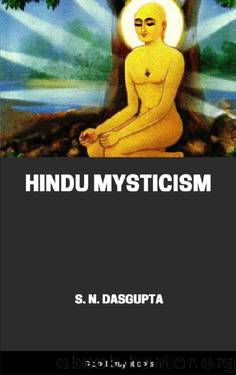Hindu Mysticism by S. N. Dasgupta

Author:S. N. Dasgupta [Dasgupta, S. N.]
Language: eng
Format: epub
Publisher: Global Grey ebooks
Published: 2019-04-22T23:00:00+00:00
* * *
Lecture 4: Buddhistic Mysticism
THE process of yoga described in the last lecture consists of a threefold course, viz., high moral elevation, physical training of the body for yoga practice, and steady mental concentration associated with the revelation of yoga wisdom, which leads to a knowledge of reality as it is. This system of thought and practice, though not without unique and distinctive features, was largely an adoption from very early times. Thus the heretical school of the Jains, which, like the Buddhistic school, holds to a monastic religion, but which was founded earlier than 500 B. C., the date of the Buddha, also considered yoga as the means of liberation of the soul. For the Jains, the liberated state of the soul is not one of pure, feelingless, non-conceptual, non-intuitional self-illumination, but is a state of supreme happiness in which the liberated self possesses a full perfection of all kinds of knowledge: perceptual, logical, alogical, intuitional and trance cognition. This liberation is attained, they believe, by the performance of yoga. Yoga with them consists mainly of a high elevation of character and complete cessation from the doing of evil, like the yoga of Patanjali described in the last lecture. They lay great emphasis on the principle of non-injury, but they also urge the necessity of the other virtues demanded by the yoga of Patanjali. Here, then, we have a system of thought according to which high moral elevation, by the cessation from all evil-doing and the acquirement of all the positive virtues is supposed to reveal a knowledge of reality as it is, and ultimately to liberate us from the bondage of our deeds and bring us to a state of perfect happiness, perfect knowledge and perfect power. The Jains, like the yogins, also believe that without the control of the mind no one can proceed in the true path. All our acts become controlled when our minds become controlled. It is by attachment and antipathy that man loses his independence. It is thus necessary for the yogin that he should be free from both attachment and antipathy and become independent in the real sense of the term. When a man learns to look upon all beings with an equal eye, he can effect such freedom, in a manner impossible even by the practice of the strictest asceticism through millions of years.
The Buddha himself, as the legendary account of his life tells us, once went out with his friends for a ride on horseback through the fields outside his capital. There he saw that, as the fields were being ploughed by the peasants, many insects were being mutilated and killed with each drive of the plough; and he saw also the sufferings of the poor beasts that were employed in the field. Extremely affected by these sufferings, he dismounted from his horse and sat on the grassy ground to reflect on the ultimate destiny of all beings. He realized that sufferings, diseases, old age and death are evils to which we are all subject.
Download
This site does not store any files on its server. We only index and link to content provided by other sites. Please contact the content providers to delete copyright contents if any and email us, we'll remove relevant links or contents immediately.
| Baha'i | Cults |
| Demonology & Satanism | Eckankar |
| Egyptian Book of the Dead | Freemasonry |
| Messianic Judaism | Mysticism |
| Scientology | Theism |
| Tribal & Ethnic | Unitarian Universalism |
The Four Agreements by Don Miguel Ruiz(6765)
Breaking Free by Rachel Jeffs(4217)
The Hatha Yoga Pradipika (Translated) by Svatmarama(3341)
120 Days of Sodom by Marquis de Sade(3273)
Member of the Family by Dianne Lake(2352)
The Tao of Physics by Fritjof Capra(2276)
The Psychedelic Gospels: The Secret History of Hallucinogens in Christianity by Jerry B. Brown(2157)
The Road to Jonestown by Jeff Guinn(2066)
Going Clear: Scientology, Hollywood, and the Prison of Belief by Lawrence Wright(1985)
Going Clear by Lawrence Wright(1967)
Uriel's Machine by Christopher Knight(1899)
The Grand Grimoire: The Red Dragon by Author Unknown(1812)
The Gnostic Gospel of St. Thomas by Tau Malachi(1798)
Key to the Sacred Pattern: The Untold Story of Rennes-le-Chateau by Henry Lincoln(1634)
Animal Speak by Ted Andrews(1624)
The Malloreon: Book 02 - King of the Murgos by David Eddings(1594)
Waco by David Thibodeau & Leon Whiteson & Aviva Layton(1559)
The New World Order Book by Nick Redfern(1550)
The Secret History of Freemasonry by Paul Naudon(1502)
